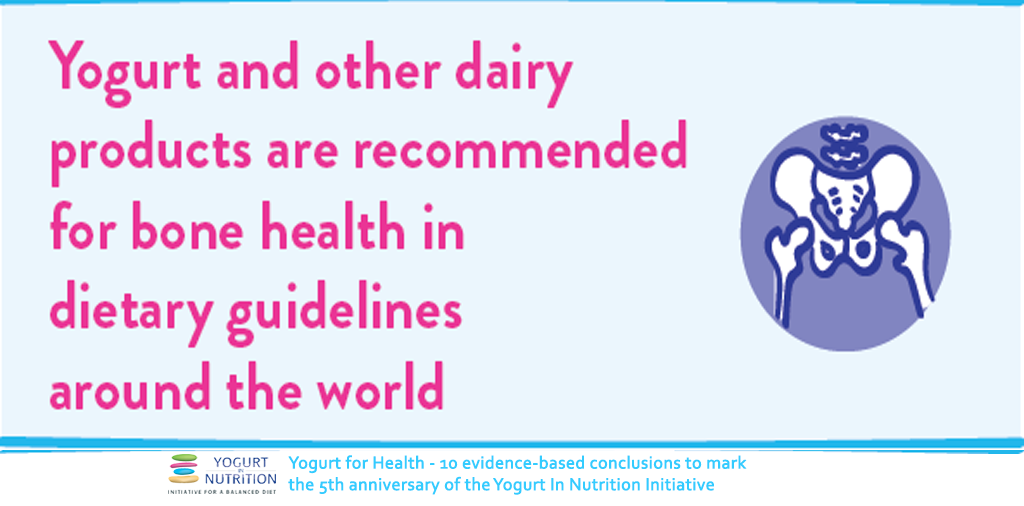“Yogurt and other dairy products are recommended for bone health in dietary guidelines around the world” is one of the 10 evidence-based conclusions made by the YINI board about the health effects of yogurt… learn more below.
Yogurt is associated with stronger bones and better physical function in older people
Increasing yogurt consumption could be a convenient way of improving the nutritional status and health of older adults, including their bone health.
The association between yogurt consumption and bone health was investigated in a study of people aged over 60 years. Results showed:
- Women who frequently ate yogurt (more than one serving/day) had stronger bones than those who rarely or never ate yogurt (less than one serving/ week). Total hip and femoral neck bone mineral density was 3.1–3.9% higher among frequent yogurt consumers.
- In men, high-yogurt consumers were found to have 12.9% higher mean vitamin D concentrations than low/non-consumers. A protective effect on bone was also suggested by changes in levels of a marker for osteoclasts – bone cells involved in the maintenance and repair of bone.
- Compared with low-/non-consumers, women who often ate yogurt had better scores for daily living activities and physical self-maintenance.
Yogurt may reduce the risk of hip fracture
Available evidence suggests that yogurt is linked to a lower risk of hip fracture in older adults.
A meta-analysis reported that a higher intake of yogurt was associated with a 25% reduction in hip fracture risk when compared with low intake.
A recent study in middle-aged and elderly Swedish women showed that low intake of fermented milk products (yogurt and soured milk) was linked to high rates of hip fracture.
Hip fracture rates were lowest among women with a high intake of fermented milk products in combination with a high intake of fruit and vegetables.
Yogurt could reduce the risk of osteoporosis
In people over the age of 60 years, statistical modelling of yogurt intake and bone health predicted that each increase of one serving per week of yogurt intake was associated with a 39% lower risk of osteoporosis in women and a 52% lower risk in men.
Encouraging older people to eat yogurt more often, particularly vitamin D- and calcium-fortified yogurt, may be a valuable public health strategy to stave off osteoporosis.
References:
- El-Abbadi NH, Dao MC, Meydani SN. Yogurt: role in healthy and active aging. Am J Clin Nutr 2014;99(5 Suppl): 1263S–70S.
- Laird E, Molloy AM, McNulty H, et al. Greater yogurt consumption is associated with increased bone mineral density and physical function in older adults. Osteoporos Int 2017;28:2409–19.
- van den Heuvel EGHM, Steijns JMJM. Dairy products and bone health: how strong is the scientific evidence? Nutr Res Rev 2018; Mar 21:1–15.
- Bian S, Hu J, Zhang K, et al. Dairy product consumption and risk of hip fracture: a systematic review and metaanalysis. BMC Public Health 2018;18:165.
- Michaëlsson K, Wolk A, Lemming EW, et al. Intake of milk or fermented milk combined with fruit and vegetable consumption in relation to hip fracture rates: a cohort study of Swedish women. J Bone Miner Res 2018;33: 449–57.
- Bonjour JP, Benoit V, Payen F, et al. Consumption of yogurts fortified in vitamin D and calcium reduces serum parathyroid hormone and markers of bone resorption: a double-blind randomized controlled trial in institutionalized elderly women. J Clin Endocrinol Metab 2013;98:2915–21.
- Bonjour JP, Benoit V, Atkin S, et al. Fortification of yogurts with vitamin D and calcium enhances the inhibition of serum parathyroid hormone and bone resorption markers: a double blind randomized controlled trial in women over 60 living in a community dwelling home. J Nutr Health Aging 2015;19:563–9.
- Sahni S, Mangano KM, Kiel DP, et al. Dairy intake is protective against bone loss in older vitamin D supplement users: the Framingham study. J Nutr 2017;147:645–52.



